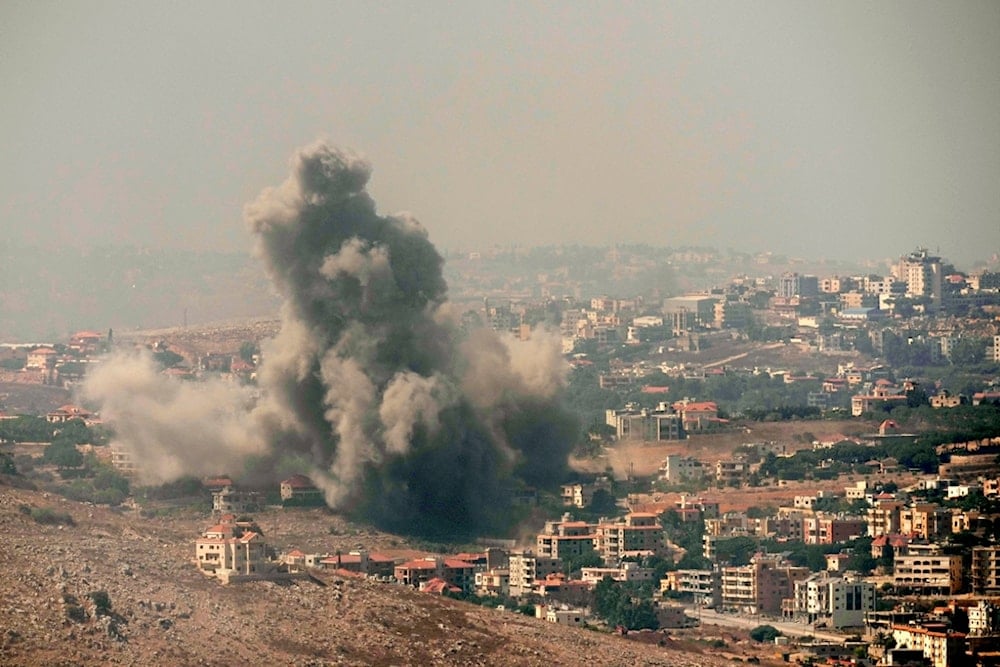Biden admin working on temporary ceasefire deal in Lebanon: Axios
The goal of the proposal is to allow negotiations for a ceasefire and a broader diplomatic solution that would prevent a wider war.
-

Smoke rises from Israeli airstrikes in the southern village of Kfar Rouman, seen from Marjayoun, south Lebanon, Wednesday, September 25, 2024. (AP)
The Biden administration is reportedly preparing a new diplomatic initiative aimed at securing a temporary halt to the aggression on Lebanon and resuming negotiations on a Gaza captive and ceasefire agreement, according to several US officials, an Israeli official, and other sources with direct knowledge of the discussions, all of whom were cited in an Axios report on Wednesday.
The initiative aims to mitigate the ongoing situation spiraling as a result of Israeli aggression on Lebanon and subsequent retaliation from the Islamic Resistance in a deal that could be announced as early as Wednesday.
According to sources cited by Axios, the White House has been coordinating with France, the Israeli occupation, Lebanon, and several Arab nations in an attempt to broker a "pause" in hostilities and facilitate a broader diplomatic resolution.
Talks on the initiative began following a phone conversation between US National Security Advisor Jake Sullivan and Israeli Minister of Strategic Affairs Ron Dermer last Monday.
US supplies bombs, attempts to mitigate tensions
"We are working with several countries on a proposal for a diplomatic solution for the North," a US official confirmed to Axios. An Israeli official added that Israeli Prime Minister Benjamin Netanyahu had approved discussions on the initiative.
The goal of the proposal is to allow negotiations for a ceasefire and a broader diplomatic solution that would prevent a wider war.
A source close to the talks indicated to Axios the initiative could facilitate the return of displaced Lebanese civilians to the country's South and Israeli settlers to northern occupied Palestine, as well as boost efforts to reach a ceasefire deal in Gaza.
"If Hamas sees that Hezbollah gives a chance for a diplomatic solution, it could encourage [Hamas] leader Yahya Sinwar to move towards a deal," the source said.
Speaking at an event in New York on Tuesday, White House Deputy National Security Advisor Jon Finer acknowledged that the administration sees a pathway to de-escalation. "We are working on it in real-time in New York and in capitals around the world," Finer said.
In Lebanon, Parliament Speaker Nabih Berri stated on Wednesday that the next 24 hours would be "crucial" for diplomatic efforts to prevent further escalation.
Hezbollah has repeatedly confirmed that its operations would only cease when the Israeli war on Gaza would come to an end, reiterating that the Lebanese front is a support front for Gaza.
Ground invasion imminent
Meanwhile, the Israeli Northern Command has indicated that a ground invasion of Lebanon may be imminent, as "Israel" continues to bombard various areas within the country.
Israeli media reported citing a source in the occupation army that, within the first two days of the aggression, "Israel" dropped over 2,000 bombs on Lebanon and carried out around 3,000 airstrikes.
Meanwhile, the Resistance in Lebanon continues to upscale its operations in "defense of Lebanon and in support of the Palestinians in Gaza and their honorable Resistance."
Hezbollah has expanded the range and scope of its rocket and drone strikes since the Israeli aggression started early Monday.
Hezbollah unveiled in a statement the Qader 1 ballistic missile, announcing that it was used to strike the Mossad command center responsible for the pagers and two-way radios terrorist attack and the assassination of the Resistance group's leaders.
The command center is based in the suburbs of Tel Aviv, Hezbollah confirmed in its statement.

 4 Min Read
4 Min Read








